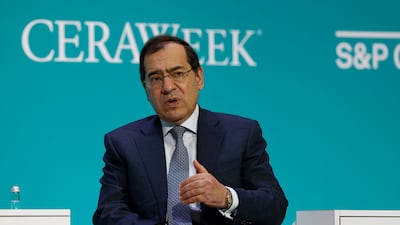Egypt has discovered a large gasfield off its north-eastern Mediterranean coastline, Oil Minister Tarek El Molla said in remarks carried by the state media on Friday.
He said the field’s reserves were still being assessed but the authoritative Middle East Economic Survey this month said it has 3.5 trillion cubic feet of gas.
The find was in Nargis, one of four offshore exploration blocks in which Chevron holds operating interests along with Egypt’s Tharwa Petroleum Co, the US oil company’s website says.
The latest find could provide a boost to Egypt's efforts to position itself as an energy hub in the eastern Mediterranean following the 2015 discovery by Italian energy company Eni of the vast Zohr gasfield.
It comes at a time when the Egyptian economy is deeply troubled by the fallout from the Russia-Ukraine war and the coronavirus pandemic before it.
Egypt is the second-biggest producer of gas in North Africa after Algeria and accounts for about 1.7 per cent of the world's proven reserves, according to the BP Statistical Review of Energy 2022. It produced about 67.8 billion cubic metres (bcm) of natural gas last year.
Egyptian officials say Egypt has been exporting $600 million worth of gas every month to Europe this year and hopes to increase that to $1 billion next year.
Underlining its desperate need to bolster exports, authorities have this year dimmed street lights and the illumination of public buildings to make more gas available for export.
Egypt is seeking to maximise the benefits of its natural gas wealth. The North African country is also seeking to boost much-needed foreign currency reserves through expanding exploration projects, developing liquefaction stations, increasing exports, signing partnerships and rationing domestic electricity consumption.
The country exported $8 billion worth of natural and liquefied gas in the 2021-2022 fiscal year, which ended on June 30. This compared with $600 million of exports in 2013-2014, government data indicated.
Egypt was a natural gas importer between 2015 and 2017, as domestic demand outweighed supply, before the discovery and start of production at Zohr.
Considered the largest field in the Eastern Mediterranean, Zohr was estimated in August 2015 to hold 850 bcm of gas, Eni said. The discovery spurred a race for more gas reserves by countries in the region.
Egypt returned to exporter status in September 2018.
In 2021, Eni made three oil and gas discoveries in Egypt's western region, with potential for up to 50 million barrels of oil equivalent in reserves.
Last year's discoveries included oil, gas and condensate reserves in the Mleiha development concession in the Western Desert region. Condensate is a lucrative liquid associated with gas production. The new discoveries are associated with fields where initial well-testing indicated stable oil flows of up to 2,500 barrels per day.

